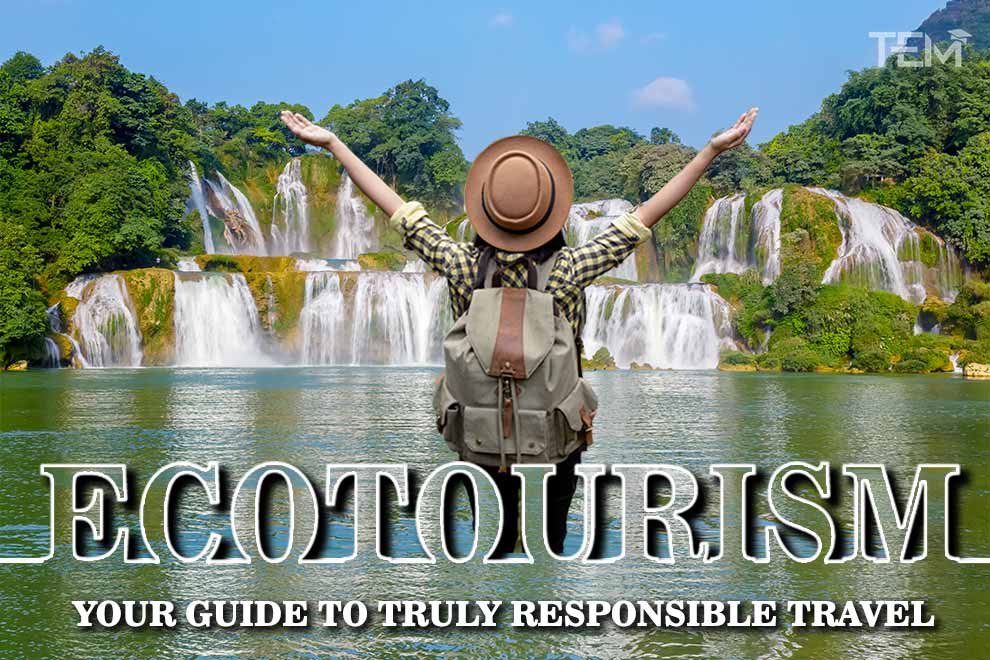We all crave that escape, right? Trading the daily grind for shimmering coastlines, whispering forests, or the buzz of a faraway city. Travel opens our eyes, broadens our horizons, maybe even helps us find ourselves a little. But here’s a tough question: Is our wanderlust leaving scars on the very places we flock to admire? In a world finally waking up to climate change and social responsibility, just packing a bag isn’t enough anymore. We need to talk about Ecotourism – and I don’t mean the buzzword slapped onto a fancy hotel brochure. I mean the real deal: travel that genuinely helps, not harms.
So, what is this “real deal” ecotourism? Forget fuzzy definitions. Think of it as a travel philosophy built on respect. The International Ecotourism Society nails it down pretty well: it’s about heading into nature responsibly, in a way that protects the environment, boosts the lives of the local folks, and teaches you something meaningful along the way.
Let’s unpack that because the details matter:
- It Starts with Nature: Yep, ecotourism’s heartland is the wild – jungles, reefs, mountains, and deserts. Places teeming with life and natural wonder.
- Conservation is Key: This isn’t optional. If your trip isn’t actively helping to keep that nature intact, it’s not ecotourism. We’re talking real efforts, like funding anti-poaching squads or restoring habitats, not just putting up a sign about reusing towels.
- People Matter, Big Time: True ecotourism puts local communities front and center. Are the jobs going to locals? Does the money you spend actually stay in the village? Does the project respect their culture? If not, it’s likely exploitation dressed up as eco-friendly.
- You Should Learn Something: Forget mindless sightseeing. Ecotourism wants you to connect. Good trips have guides (often local experts!) who help you understand the delicate balance of the ecosystem, the local culture, and the challenges the region faces. You leave richer in knowledge and perspective.
Hold On, Don’t Get Fooled!
Because “eco” is trendy, beware of imposters:
- Nature Trips ≠ Ecotourism: Hiking in a park is great, but if the park lodge pollutes the river and profits flow overseas, that’s not it.
- Adventure Isn’t Enough: Zip-lining through the canopy is thrilling, but if the company running it doesn’t care about conservation or local jobs, it’s just adventure travel.
- Watch Out for “Greenwashing”: Slapping solar panels on a roof doesn’t automatically make a resort eco-friendly. Look deeper. Ask tough questions. Real ecotourism operators are transparent about their practices and impacts. Look for credible certifications (like those recognized by the GSTC), but use your common sense too.
- It’s Not Just Roughing It: Sure, some eco-trips involve tents, but others are comfortable lodges that cleverly use sustainable tech. The core principles matter more than the thread count of the sheets.
Why Bother? The Awesome Power of Choosing Eco
Okay, so it takes a bit more effort. Why should you care? Because choosing genuine ecotourism sends out positive ripples you might not even expect:
- Saving Wild Places: When locals see that keeping a forest standing or a reef healthy brings in tourist dollars, suddenly, conservation makes economic sense. It creates a powerful local defence against logging or overfishing. Your tourist fee might literally pay a ranger’s salary.
- Lifting Communities: Think about it: jobs for guides, cooks, lodge staff, and craftspeople. Money spent on local food. Ecotourism can provide a lifeline in remote areas, offering a sustainable way to earn a living that doesn’t destroy the environment they depend on. It builds resilience.
- Keeping Cultures Alive: When done right, ecotourism celebrates local traditions and knowledge. Visitors get a genuine taste of the local culture (way better than a cheesy tourist show!), and communities feel validated in preserving their heritage.
- Travel That Truly Transforms: Honestly, isn’t this what we travel for? Learning from a local elder about medicinal plants, tracking wildlife with an expert guide, knowing your visit makes a positive difference… that connection is profound. It sticks with you long after the tan fades.
- Creating Ambassadors: When you have these amazing, eye-opening experiences, you talk about them! You become an accidental advocate for conservation and responsible travel.
Okay, I’m In. How Do I Do Ecotourism?
Ready to travel better? It boils down to being a conscious consumer:
- Do Your Homework (Seriously):
- Pick Places with Purpose: Some countries or regions just get sustainable tourism better than others. Seek them out.
- Dig Deep on Operators: Don’t just trust the pretty website. Search for reviews focusing on sustainability. Look for those certifications we talked about. Ask them directly: How do you help locals? How do you manage waste? Where does the money go? Vague answers are a red flag
- Go Local: If you have a choice, pick the guesthouse owned by a local family over the international chain every time.
- Pick Places with Purpose: Some countries or regions just get sustainable tourism better than others. Seek them out.
- Pack Like You Care:
- Ditch the Disposables: Reusable bottle, coffee cup, shopping bag – you know the drill. Those little plastic hotel toiletries? Leave ’em. Solid shampoo bars are great!
- Choose Greener Gear: Reef-safe sunscreen is a must near oceans. Biodegradable soaps help. Every little bit counts.
- Lighten Your Load: Less luggage weight = less fuel burned. Simple.
- Ditch the Disposables: Reusable bottle, coffee cup, shopping bag – you know the drill. Those little plastic hotel toiletries? Leave ’em. Solid shampoo bars are great!
- Act Like a Gracious Guest (Because You Are):
- Wildlife Watching Wisdom: Keep your distance. Never, ever feed wild animals (it messes them up). Avoid tours offering hands-on encounters unless run by legit conservation experts with super strict rules. Stick to trails. Shhh! Enjoy the sounds of nature; don’t add noise pollution.
- Resource Mindfulness: Water and power are precious, especially in remote areas. Be frugal. Lights off? AC off? Good.
- Leave No Trace (Literally): Pack it in, pack it out. Don’t leave anything behind. Use designated bins or carry your trash until you find one.
- Cultural Sensitivity is Key: Dress appropriately. Ask before snapping photos of people (how would you like it?). Learn a few basic local phrases – it goes a long way! Be aware of local customs. Keep your voice down in villages.
- Wildlife Watching Wisdom: Keep your distance. Never, ever feed wild animals (it messes them up). Avoid tours offering hands-on encounters unless run by legit conservation experts with super strict rules. Stick to trails. Shhh! Enjoy the sounds of nature; don’t add noise pollution.
- Spend Your Money Where It Counts:
- Support Local Hustle: Buy crafts directly from the maker. Eat at that small family-run cafe. Hire local guides. Pay fair prices – haggling too hard can hurt people living on the edge.
- Fees Fund the Future: Park entrance fees usually go straight back into conservation. Pay them gladly! Consider a small donation to a local project if you’re moved by their work.
- Support Local Hustle: Buy crafts directly from the maker. Eat at that small family-run cafe. Hire local guides. Pay fair prices – haggling too hard can hurt people living on the edge.
- Think About Your Flight’s Footprint:
- Flying is rough on the climate, no denying it. Look into reputable carbon offset programs (check for Gold Standard or VCS certification) to help balance the scales. It’s not a magic bullet (flying less is best!), but it’s a responsible step. Fly direct when possible.
- Flying is rough on the climate, no denying it. Look into reputable carbon offset programs (check for Gold Standard or VCS certification) to help balance the scales. It’s not a magic bullet (flying less is best!), but it’s a responsible step. Fly direct when possible.
Let’s Be Real: It’s Not Always Easy
Ecotourism isn’t perfect. We need to be honest about that:
- The Greenwashers: They’re out there, muddying the waters with fake eco-claims. Stay sharp.
- Too Much of a Good Thing: Popular spots can get overwhelmed. Good management needs to limit visitor numbers to protect fragile places and communities.
- Where Does the Money Go?: Sometimes, even with good intentions, too much cash flows out to big international companies. Supporting truly local businesses is crucial.
- Who Gets to Go?: Eco-destinations can be remote, require fitness, or cost more, making them inaccessible for some. That’s a real challenge.
The Bottom Line: Travel with Heart
Despite these hurdles, genuine ecotourism offers a hopeful path forward. It’s about shifting our mindset from consuming a destination to connecting with it. It’s realizing our choices as travellers have power – the power to protect incredible ecosystems, support vibrant communities, and enrich our own lives in ways a standard vacation never could.
So, next time you plan a trip, dig a little deeper. Ask questions. Choose wisely. Travel with intention, curiosity, and respect. Let’s make our adventures part of the solution, not the problem. The world – and its people – will thank you for it.
ALSO READ: Top 5 Museum-Visits you should add to your bucket list










